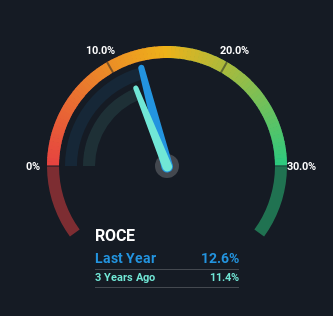Stock Analysis

There are a few key trends to look for if we want to identify the next multi-bagger. Firstly, we'll want to see a proven return on capital employed (ROCE) that is increasing, and secondly, an expanding base of capital employed. Basically this means that a company has profitable initiatives that it can continue to reinvest in, which is a trait of a compounding machine. So, when we ran our eye over Delta's (NSE:DELTACORP) trend of ROCE, we liked what we saw.
What Is Return On Capital Employed (ROCE)?
For those who don't know, ROCE is a measure of a company's yearly pre-tax profit (its return), relative to the capital employed in the business. Analysts use this formula to calculate it for Delta:
Return on Capital Employed = Earnings Before Interest and Tax (EBIT) ÷ (Total Assets - Current Liabilities)
0.13 = ₹2.9b ÷ (₹25b - ₹2.2b) (Based on the trailing twelve months to March 2023).
Thus, Delta has an ROCE of 13%. On its own, that's a standard return, however it's much better than the 9.9% generated by the Hospitality industry.
View our latest analysis for Delta

While the past is not representative of the future, it can be helpful to know how a company has performed historically, which is why we have this chart above. If you're interested in investigating Delta's past further, check out this free graph of past earnings, revenue and cash flow.
SWOT Analysis for Delta
- Earnings growth over the past year exceeded the industry.
- Currently debt free.
- Dividend is low compared to the top 25% of dividend payers in the Hospitality market.
- Current share price is above our estimate of fair value.
- DELTACORP's financial characteristics indicate limited near-term opportunities for shareholders.
- Lack of analyst coverage makes it difficult to determine DELTACORP's earnings prospects.
- Dividends are not covered by cash flow.
What Can We Tell From Delta's ROCE Trend?
While the returns on capital are good, they haven't moved much. The company has employed 34% more capital in the last five years, and the returns on that capital have remained stable at 13%. 13% is a pretty standard return, and it provides some comfort knowing that Delta has consistently earned this amount. Over long periods of time, returns like these might not be too exciting, but with consistency they can pay off in terms of share price returns.
The Bottom Line
The main thing to remember is that Delta has proven its ability to continually reinvest at respectable rates of return. And given the stock has only risen 12% over the last five years, we'd suspect the market is beginning to recognize these trends. So to determine if Delta is a multi-bagger going forward, we'd suggest digging deeper into the company's other fundamentals.
One more thing: We've identified 2 warning signs with Delta (at least 1 which is a bit unpleasant) , and understanding them would certainly be useful.
For those who like to invest in solid companies, check out this free list of companies with solid balance sheets and high returns on equity.
Valuation is complex, but we're helping make it simple.
Find out whether Delta is potentially over or undervalued by checking out our comprehensive analysis, which includes fair value estimates, risks and warnings, dividends, insider transactions and financial health.
View the Free AnalysisHave feedback on this article? Concerned about the content? Get in touch with us directly. Alternatively, email editorial-team (at) simplywallst.com.
This article by Simply Wall St is general in nature. We provide commentary based on historical data and analyst forecasts only using an unbiased methodology and our articles are not intended to be financial advice. It does not constitute a recommendation to buy or sell any stock, and does not take account of your objectives, or your financial situation. We aim to bring you long-term focused analysis driven by fundamental data. Note that our analysis may not factor in the latest price-sensitive company announcements or qualitative material. Simply Wall St has no position in any stocks mentioned.
About NSEI:DELTACORP
Delta
Delta Corp Limited, together with its subsidiaries, operates in the gaming and entertainment, and hospitality businesses in India and internationally.
Excellent balance sheet average dividend payer.

